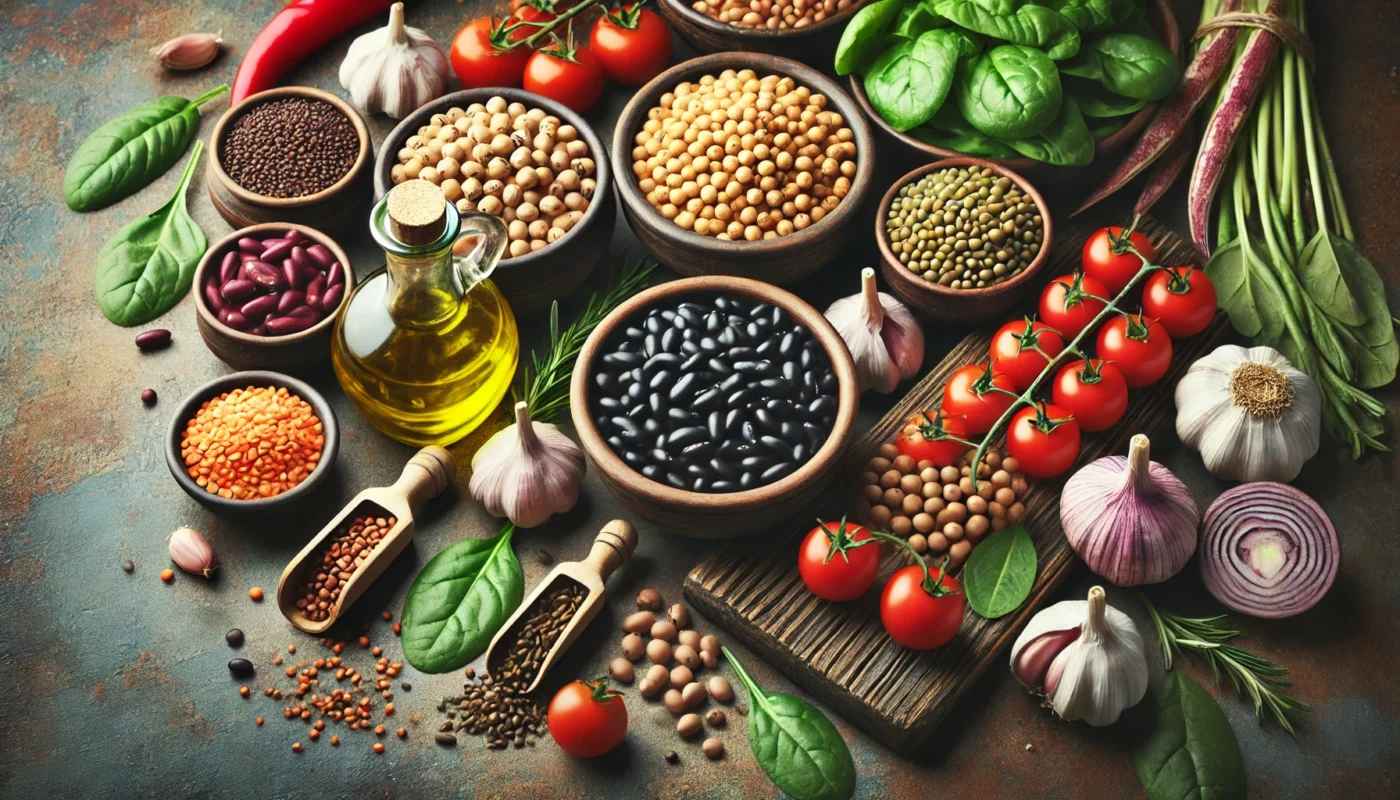Beans are a staple in many diets worldwide. They’re packed with nutrients and offer numerous health benefits.
But, are beans anti-inflammatory? This question has sparked much interest and debate.
Inflammation is a natural response of our bodies. It’s crucial for healing and protecting us from harm. However, when inflammation becomes chronic, it can lead to various health issues.
Diet plays a significant role in managing inflammation. Certain foods can either trigger or reduce inflammation.
Beans, as part of the legume family, are rich in fiber, protein, and antioxidants. These components are known for their potential anti-inflammatory effects.
But, there’s more to the story. The relationship between beans and inflammation is complex and multifaceted.
This article aims to delve into this topic. We’ll explore the nutritional profile of beans, their potential anti-inflammatory properties, and how to incorporate them into your diet.
Whether you’re a fitness enthusiast, a health-conscious individual, or a medical patient, this comprehensive guide will provide you with valuable insights. Let’s embark on this journey to better understand the power of beans in combating inflammation.
You May Also Like: Inflammatory Diseases: Causes and Treatments Explained
Understanding Inflammation and Its Impact on Health
Inflammation is a complex biological response. It’s essential for healing and defending against infections. However, not all inflammation is beneficial.
There are two types of inflammation: acute and chronic. Acute inflammation is short-term and part of the body’s natural repair process. It usually resolves after the threat is removed.
Chronic inflammation, on the other hand, is long-lasting. It persists even without immediate threats, potentially leading to various health issues like arthritis, heart disease, and diabetes.
Factors contributing to chronic inflammation include poor diet, lack of exercise, and stress. Environmental toxins and lifestyle choices also play a role. Managing inflammation requires a holistic approach that addresses these factors.
Diet is a powerful tool in controlling inflammation. Some foods can exacerbate or alleviate inflammation. Key components of an anti-inflammatory diet include:
- Fruits and vegetables rich in antioxidants
- Healthy fats from sources like fish and nuts
- Whole grains and legumes for fiber
- Minimal processed foods and sugars
Understanding and managing inflammation is crucial for overall health. Addressing the causes and making informed dietary choices can significantly impact well-being. Through awareness and proactive strategies, it’s possible to harness the body’s natural defenses, promoting long-term health and vitality.
The Nutritional Profile of Beans
Beans are often regarded as nutritional powerhouses. They are packed with essential nutrients and provide a myriad of health benefits. A staple in many diets, beans are highly valued for their versatility and nutrient density.
A key feature of beans is their high fiber content. Fiber is essential for a healthy digestive system, helping to promote regular bowel movements. It also aids in controlling blood sugar levels and supports heart health by lowering cholesterol.
Beans are also rich in plant-based protein. This makes them an excellent choice for vegetarians and vegans. Protein is crucial for building and repairing tissues, as well as supporting immune function.
In addition to protein and fiber, beans are loaded with vitamins and minerals. They contain important nutrients like folate, iron, magnesium, potassium, and zinc. Each of these plays a significant role in maintaining energy levels and supporting cellular functions.
Furthermore, beans are a good source of antioxidants. These compounds help combat oxidative stress, which contributes to inflammation and aging. Antioxidants can also reduce the risk of chronic diseases by neutralizing free radicals in the body.
Here’s a summary of the key nutrients found in beans:
- High in dietary fiber
- Rich in plant-based protein
- Abundant in essential vitamins and minerals such as folate, iron, and potassium
- Sources of antioxidants beneficial for cellular health
Beans provide a comprehensive array of nutrients that benefit multiple bodily systems. Incorporating them into your diet is a simple yet effective strategy to enhance overall nutrition. By adding beans to your meals, you can help bridge nutritional gaps, support a balanced diet, and promote wellness. Whether through soups, stews, or salads, beans offer a delicious and nutritious option for anyone seeking to improve their health.

Are Beans Anti-Inflammatory?
The question of whether beans are anti-inflammatory is intriguing and multifaceted. Inflammation is a natural response of the body to injury or infection. Yet, chronic inflammation can lead to various health issues, including heart disease and arthritis.
Beans may help reduce inflammation due to their nutrient composition. They contain dietary fiber, antioxidants, and polyphenols. These components are known for their potential anti-inflammatory effects.
Fiber, found abundantly in beans, plays a vital role in reducing inflammation. It supports gut health by promoting the growth of beneficial bacteria. A healthy gut microbiome can help lower inflammation throughout the body.
Antioxidants present in beans also contribute to their anti-inflammatory properties. They help neutralize harmful free radicals, which can cause cell damage and promote inflammation. Polyphenols, another component of beans, have shown anti-inflammatory effects in scientific studies.
However, it’s important to consider individual variability. Some people might experience digestive discomfort when consuming beans, which can be mistaken for inflammation. Proper preparation, such as soaking and cooking, can minimize these effects and maximize the benefits.
In summary, beans have the potential to support an anti-inflammatory diet, owing to their rich nutrient profile. They offer a delicious way to enhance your diet while potentially mitigating inflammation. Understanding how beans interact with your body can help in designing a diet that supports long-term health and wellness.
Scientific Research on Beans and Inflammation
Scientific research offers interesting insights into the relationship between beans and inflammation. Numerous studies focus on how beans can affect inflammatory markers in the body. For instance, some research indicates that consuming beans can help lower C-reactive protein (CRP), a key marker of inflammation.
One study examined the effects of bean consumption on inflammation in adults with type 2 diabetes. Participants showed a notable reduction in inflammatory markers after incorporating beans into their diets. These findings suggest beans might be beneficial in managing inflammation for certain health conditions.
Researchers also highlight the antioxidant properties of beans. Antioxidants combat oxidative stress, which can trigger inflammatory responses. Beans contain compounds like flavonoids and phytochemicals, which are powerful antioxidants with potential to reduce inflammation.
Additionally, studies suggest that the fiber in beans supports reduced inflammation. Dietary fiber enhances gut health, which in turn may influence systemic inflammation. A healthy gut microbiome can potentially decrease inflammatory responses in the body.
Here are some key points from various studies:
- Beans may help lower CRP levels.
- The antioxidants in beans fight oxidative stress.
- Fiber from beans supports a healthy gut and reduces inflammation.
While these findings are promising, more research is needed to understand fully the mechanisms through which beans affect inflammation. Individual responses can vary, so more studies can help clarify how different types of beans interact with inflammatory processes.
In conclusion, existing research supports the potential anti-inflammatory benefits of beans. However, as with any dietary choice, consulting with healthcare professionals is wise. They can provide personalized advice based on current scientific evidence. This way, you can incorporate beans into your diet in a manner that supports optimal health outcomes.
Types of Beans and Their Anti-Inflammatory Properties
Beans come in many varieties, each with unique benefits and flavors. Some types of beans boast specific anti-inflammatory properties. Understanding these can help you select the best options for your diet.
The anti-inflammatory properties of beans often relate to their rich nutrient content. They are packed with vitamins, minerals, and antioxidants that are instrumental in reducing inflammation. Particular compounds within various beans may offer distinct benefits.
For example, kidney beans and pinto beans are known for their high fiber content. This fiber plays a crucial role in maintaining gut health and potentially reducing inflammation. A healthy gut reduces inflammatory responses throughout the body.
Chickpeas and navy beans are rich in certain phytochemicals. These compounds have shown potential in managing inflammation and oxidative stress. Their inclusion in the diet may contribute to lower inflammation levels.
Popular beans with anti-inflammatory potential include:
- Kidney Beans: High in fiber.
- Pinto Beans: Rich in polyphenols.
- Chickpeas: Contain beneficial phytochemicals.
- Navy Beans: Provide both fiber and antioxidants.
- Black Beans: Known for their anthocyanins.
Choosing a variety of beans allows you to benefit from their diverse nutritional profiles. Including different types in your diet ensures a broad range of nutrients essential for health. Regular consumption of these beans may offer protective benefits against inflammation.
Black Beans and Inflammation
Black beans, in particular, stand out for their inflammation-fighting abilities. They are packed with anthocyanins, a powerful group of antioxidants. These compounds combat oxidative stress, a contributor to inflammation.
The nutrient density of black beans is impressive. They are a good source of protein, fiber, and essential minerals such as iron and magnesium. These nutrients support bodily processes that can help reduce inflammation.
Incorporating black beans into your meals is simple and nutritious. From soups to salads, they offer versatility while boosting your intake of anti-inflammatory nutrients. For those focused on reducing inflammation, black beans are a valuable dietary addition.
Lentils: A Closer Look at Their Anti-Inflammatory Effects
Lentils, often praised for their health benefits, also possess anti-inflammatory properties. They are rich in polyphenols, which have demonstrated anti-inflammatory effects in studies. These compounds help protect cells from the stress that can cause inflammation.
Aside from polyphenols, lentils are high in dietary fiber. This fiber is linked to better gut health and reduced inflammation. A well-functioning gut can lower inflammation, which is vital for overall health.
Lentils are easy to cook and can be added to a range of dishes, from stews to curries. Their nutritional profile, combined with their role in managing inflammation, makes them a superb choice. Adding lentils to your meals can enhance both flavor and health benefits.
The Controversy Around Lectins and Inflammation
Lectins are proteins found in various foods, including beans. They have sparked controversy due to claims they might contribute to inflammation and digestive issues. Some believe that lectins can impair gut health and trigger inflammatory responses.
However, the picture is more nuanced than it seems. Many studies show that typical cooking methods, like boiling, effectively reduce lectin content in beans. When prepared correctly, the risk of lectin-related inflammation is minimized.
Moreover, beans offer various nutrients that counteract potential downsides. The fiber and antioxidants present in beans support gut health and lower inflammation. Thus, while lectins are a point of debate, the benefits of eating properly cooked beans often outweigh the concerns. By preparing beans properly, you can enjoy their nutritional value without significant risk. Consulting a healthcare provider can further tailor your approach based on personal health needs.

How to Prepare and Cook Beans for Optimal Benefits
Preparing beans correctly is crucial to maximizing their health benefits while minimizing potential downsides. Proper preparation can enhance nutrient availability and improve digestibility.
Begin by soaking dried beans. This step can reduce cooking time and lessen certain compounds, like phytic acid, which can interfere with nutrient absorption. Soaking also helps to break down complex sugars, reducing digestive discomfort.
Cooking beans thoroughly is essential. Heat neutralizes lectins and enhances the bioavailability of beneficial nutrients. Whether you boil, pressure cook, or use a slow cooker, ensure they are fully cooked until tender.
Here are some tips for optimal preparation:
- Soak beans overnight: This helps to reduce anti-nutrients.
- Rinse before cooking: Discard soaking water to further reduce unwanted compounds.
- Cook with spices: Add spices like ginger or turmeric, known for anti-inflammatory properties, to enhance flavor and health benefits.
Avoid adding acidic ingredients like tomatoes or vinegar until beans are fully cooked, as they can prolong cooking time. Incorporating these practices ensures you enjoy the full nutritional profile and benefits of beans. Adjust techniques to personal dietary needs and preferences for best results.
Incorporating Beans into an Anti-Inflammatory Diet
Adding beans to an anti-inflammatory diet can be a simple yet effective strategy. They are versatile, nutritious, and complement other anti-inflammatory foods like leafy greens and olive oil. Beans provide plant-based protein and are rich in fiber, which supports gut health.
To successfully incorporate beans, consider the variety and frequency of consumption. Each type of bean offers different nutrients and benefits. Rotating beans such as lentils, black beans, and chickpeas in weekly meals can ensure diverse nutrient intake and sustained interest.
Pair beans with foods that enhance their anti-inflammatory effects. For instance, adding beans to a salad with vegetables and omega-3-rich walnuts creates a powerful meal. Such combinations not only promote health but also satisfy taste preferences.
Here’s how beans fit into an anti-inflammatory diet:
- As a plant-based protein source: Suitable for vegetarians.
- Mixed with anti-inflammatory spices: Ginger, turmeric, and cumin enhance flavor and benefits.
- Blended into soups: Creates comforting, nutrient-packed meals.
Beans are also budget-friendly and environmentally sustainable. Choosing organic varieties may reduce exposure to pesticides and support local farming practices. Whether adopting a Mediterranean diet or simply reducing inflammatory markers, beans are a valuable component. The key is to integrate them regularly and creatively, aligning with personal dietary needs and preferences.
Practical Tips for Adding Beans to Your Meals
Incorporating beans into everyday meals doesn’t have to be daunting. With a few practical strategies, you can enjoy their health benefits without sacrificing taste or convenience.
Start by exploring different culinary traditions. Many cultures have delicious bean-based dishes. For instance, try Mexican-inspired black bean tacos or Indian lentil dal.
Batch cooking is another practical approach. Prepare large quantities of your favorite bean dish and store it for later use. This saves time and ensures you always have a healthy option available.
Consider these tips for easy integration:
- Use canned beans for convenience: Rinse them to reduce sodium content.
- Add beans to salads: They add texture and protein.
- Blend beans into dips or spreads: Hummus is a classic example.
These strategies can transform beans from a side dish to the center of your meals. They cater to varied tastes and dietary needs, making beans a versatile and beneficial addition to your diet.
Addressing Common Concerns: Digestibility and Allergies
For some, the digestibility of beans can be a concern. Beans contain oligosaccharides, which can cause bloating and gas. However, proper preparation can significantly reduce these effects. Soaking beans overnight and changing the water before cooking can decrease their oligosaccharide content.
Allergies to beans are rare but possible. Some individuals may experience symptoms like hives or itching. It’s important to introduce beans gradually, especially in children, and observe for any adverse reactions. Consulting a healthcare provider is advisable if you suspect an allergy.
Those with digestive issues may benefit from specific strategies. Starting with small portions of beans and gradually increasing intake can help the digestive system adjust. Integrating digestive herbs like ginger or peppermint in bean dishes can also ease digestion. Emphasizing these practices ensures beans are not only nutritious but also enjoyable for everyone.
The Role of Beans in Managing Health Conditions
Beans are more than just a source of protein and fiber. They also offer numerous health benefits, particularly in managing chronic conditions. Their rich nutrient profile makes them invaluable in a health-conscious diet.
For individuals with heart conditions, beans can be a heart-friendly choice. They are low in cholesterol and packed with heart-healthy nutrients. Regular consumption of beans has been linked to reduced blood pressure and improved cholesterol levels.
Diabetes management can also benefit from beans. The low glycemic index of beans helps control blood sugar levels. Their fiber content promotes steady glucose absorption, making them a smart choice for diabetics.
Here are some health conditions where beans may play a supportive role:
- Heart Disease: Lower cholesterol and blood pressure.
- Diabetes: Manage blood sugar with low glycemic index foods.
- Weight Management: Aid in feeling full due to high fiber content.
- Digestive Health: Improve gut health through fiber and prebiotics.
For those seeking to manage weight, beans can help control appetite. Their high fiber content promotes a feeling of fullness, reducing the likelihood of overeating. By incorporating beans into meals, individuals can enjoy a nutritious and satisfying food option while potentially mitigating the risk of various health issues.

Conclusion: Embracing Beans for Holistic Health
Incorporating beans into your diet can offer a wealth of health benefits. Their anti-inflammatory properties, alongside a rich nutrient profile, support overall wellness. By understanding how beans can influence health, especially in reducing inflammation, one can make informed dietary choices.
Whether you’re managing a health condition or simply aiming for a balanced diet, beans can be a versatile addition. They not only contribute to physical health but also align with a sustainable lifestyle. Embrace beans as a holistic approach to health, enhancing your wellbeing in practical, impactful ways.
Further Reading:
National Library of Medicine: Potential anti-inflammatory effects of legumes: a review
Harvard Health Publishing: Anti-inflammatory food superstars for every season
Children’s Hospital of Philadelphia: Food as Medicine: Anti-Inflammatory Diet
beans, health benefits, anti-inflammatory diet, nutrition, digestibility, cooking tips, plant-based protein, chronic conditions, weight management, dietary fiber, holistic health, sustainable eating, meal planning, digestive health, allergies
Important Note: The information contained in this article is for general informational purposes only, and should not be construed as health or medical advice, nor is it intended to diagnose, prevent, treat, or cure any disease or health condition. Before embarking on any diet, fitness regimen, or program of nutritional supplementation, it is advisable to consult your healthcare professional in order to determine its safety and probable efficacy in terms of your individual state of health.
Regarding Nutritional Supplements Or Other Non-Prescription Health Products: If any nutritional supplements or other non-prescription health products are mentioned in the foregoing article, any claims or statements made about them have not been evaluated by the U.S. Food and Drug Administration, and such nutritional supplements or other health products are not intended to diagnose, treat, cure, or prevent any disease.

